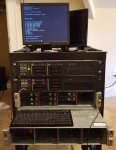Ok, an update on this.
Short version
It seems that FreeNAS 11.2 requires
much faster boot device than FreeNAS 11.1 did so I will switch to SSDs on SATA for boot.
I will probably go for
Kingston SSDnow A400 in the 120GB version and have 2 of those for a mirrored boot device, do a fresh install of FreeNAS 11.2, and then reimport my configuration and storage.
It also does not seem to matter (for me, on the ASRock Rack C2550D4I motherboard) whether the boot device is BIOS or UEFI.
And BTW, my existing boot device is actually a BIOS boot device (and not UEFI as I incorrectly suggested above). If it was a UEFI boot device, the first GPT partition would have exactly this rawtype (output from
gpart list):
rawtype: c12a7328-f81f-11d2-ba4b-00a0c93ec93b
which is has not.
Long version
After shutting down the system, I disconnected all my storage disks and my boot devices (2 x Kingston DataTraveller 2, 16GB, USB2). I then borrowed two USB sticks and used one for the installation media and the other as a new boot device to try out a fresh install.
The boot device is a Kingston DataTraveller 3, 64 GB, USB3. However, the C2550D4I motherboard has only USB2 ports, so it will be used as a USB2 device.
The USB device is mapped to SCSI with this driver in FreeBSD (as seen on the console output):
Removable Direct Access SPC-4 SCSI device
1) Fresh 11.2-U7 installation with BIOS bootloader
Installation: 12:30 minutes.
First boot: 7 minutes. (first boot includes some first time initialization and is a little slower)
Second boot: 6:30 minutes.
Mounting root filesystem: 1-2 minutes
Shutdown and poweroff: 25 seconds.
2) Fresh 11.2-U7 installation with UEFI bootloader
Installation: 9:30 minutes
First boot: 7:30 minutes.
Second boot: 6 minutes.
Mounting root filesystem: 1-2 minutes
Shutdown and poweroff: 10 seconds.
Now, I removed the boot device and reattached my existing mirrored boot devices (which are BIOS, see above), but left my storage disconnected.
The USB device is mapped to SCSI with this driver in FreeBSD (as seen on the console output):
Removable Direct Access SPC-2 SCSI device
3) Boot into 11.1-U7 environment on existing boot media – storage disks disconnected
Boot time: 4:30 minutes
Mounting root filesystem: 1:30 minutes
4) Boot into 11.2-U7 environment on existing boot media – storage disks disconnected
Boot time: 14:30 minutes –
yes, 10 minutes slower.
Mounting root filesystem: 2:30 minutes
Now, I reconnected my storage disks.
5) Boot into 11.2-U7 environment on existing boot media – storage disks connected
Boot time: 24 minutes –
yes, an additional 10 minutes slower
Mounting root filesystem: 7 minutes
Conclusion
To me it simply looks like FreeNAS 11.2 requires a
much faster boot device compared to 11.1. I am not sure why.
I also do not understand why mounting the root device with storage attached takes so much longer than without storage attached. The reason might be that it actually does not take long time, but that FreeBSD/FreeNAS does not output messages of what it is doing right after mounting the root filesystem so it is something else (involving reading and/or writing to the boot media) that takes the extra time.
So the conclusion must be that it is time to move to SSDs for boot device.
I will probably go for
Kingston SSDnow A400 in the 120GB version and have 2 of those for a mirrored boot device, do a fresh install of FreeNAS 11.2, and then reimport my configuration and storage.

